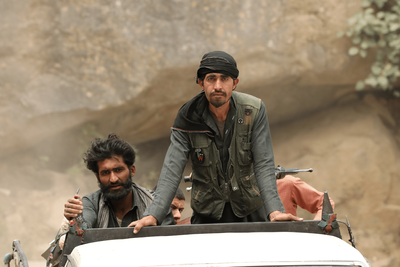LGBT Afghans and people who do not conform to rigid gender norms in Afghanistan have faced an increasingly desperate situation and grave threats to their safety and lives under the Taliban, Human Rights Watch and OutRight Action International said in a new report.
The 43-page report, “‘Even If You Go to the Skies, We’ll Find You’: LGBT People in Afghanistan After the Taliban Takeover,” is based on 60 interviews with LGBT Afghans.
Many reported that Taliban members attacked or threatened them because of their sexual orientation or gender identity. Others reported abuse from family members, neighbors, and romantic partners who now support the Taliban or believed they had to act against LGBT people close to them to ensure their own safety, according to the Human Rights Watch.
Some queer Afghans fled their homes from attacks by Taliban members or their supporters pursuing them because of their sexual orientation or gender identity.
“We spoke with LGBT Afghans who have survived gang rape, mob attacks, or have been hunted by their own family members who joined the Taliban, and they have no hope that state institutions will protect them,” said J. Lester Feder, senior fellow for emergency research at OutRight Action International.
“For those LGBT people who want to flee the country, there are few good options; most of Afghanistan's neighbors also criminalize same-sex relations. It is difficult to overstate how devastating – and terrifying – the return of Taliban rule has been for LGBT Afghans.”
READ THE FULL REPORT HERE.
It comes as human rights advocacy groups and LGBTQ rights watchdogs around the world issued warnings that the situation in Afghanistan following the Taliban's coup will lead to increased persecution of LGBTQ+ people there.
“As Afghanistan falls to the Taliban, members of the LGBTIQ community are among those at greatest risk of suffering under Taliban rule," tweeted the Organization for Migration, Refuge and Asylum. “The international community must act quickly and decisively to aid all those fleeing persecution."
Founder and director of MOSAIC, a Lebanon-based advocacy group that works in the Middle East and North Africa, Charbel Maydaa told the Washington Blade that the Taliban can use Sharia law to target LGBTQ people and consolidate power.
While Maydaa noted that the incoming Taliban may want “to look good in front of the international community," how they rule their country on the ground is another matter.
Maydaa said three female academics with whom he has worked “disappeared" five days ago. “We lost contact with many people there," said Maydaa. “We don't know what's happening. They're not online or they are really afraid to talk on Facebook."
According to Maydaa ILGA Asia is currently working to find shelters for LGBTQ people in Afghanistan before they flee the country. Maydaa added ILGA Asia is also “trying to advocate for some governments" to “literally rescue them."
ILGA Asia posted a statement on Aug. 17: "Without a doubt, women and the progressive civil society, along with the LGBT community, leading activists, and Afghanistan's civil society in general will be severely harmed by this rapid and unjust cataclysm in the most brutal way possible. We are also concerned for innocent people who are now forced to live in the shadows facing the fear of Taliban's threats. The International community is absolutely responsible for this situation."
Rainbow Railroad, a global nonprofit that aims to help LGBTQ people facing persecution escape their home countries, also issued a statement on the situation which they anticipate will lead to many LGBTQ Afghanis seeking international asylum.
"There is great worry that the return of the Taliban will mean the return of grave human rights abuses, including the loss of basic human rights for women and girls, more gender-based violence and the extreme persecution of LGBTQI+ people," said the statement.
"Afghanistan already is not a safe place to be LGBTQI+. According to the U.S. State Department, public attitudes across the diversity of Afghan society towards LGBTQI+ people are extremely negative, which leads members of the LGBTQ+ community to keep their gender identity and sexual orientation a secret in fear of harassment, intimidation, persecution, and death. Now, with the return of the Taliban, there is understandable fear that the situation will worsen.
Rainbow Railroad is concerned that the return to power of the Taliban will lead to instances of extreme violence directed at members of the LGBTQI+ community in Afghanistan. And although it remains to be seen how the Taliban will respond to international pressure to uphold human rights, early signs are not encouraging. Just last month, a Taliban judge threatened that gay men will be crushed to death by toppling walls onto them should the group regain control of Afghanistan."
It comes as thousands of people attempted to flee Afghanistan this week as Taliban forces gained control of the country, centered in the capital city of Kabul on Aug. 15.
At least 400,000 Afghans have been forcibly displaced this year, according to the United Nations. On Aug. 13 Canada pledged to resettle 20,000 minority Afghans who might be targeted by the Taliban. The U.S. also announced on Aug. 17 that it will allocate $500 million to allow for an increase in Afghan refugees.
Afghanistan's Constitution establishes Sharia law as a precursor to all other laws, allowing for religious interpretations by the State to prohibit and punish consensual same-sex sexual activity.
